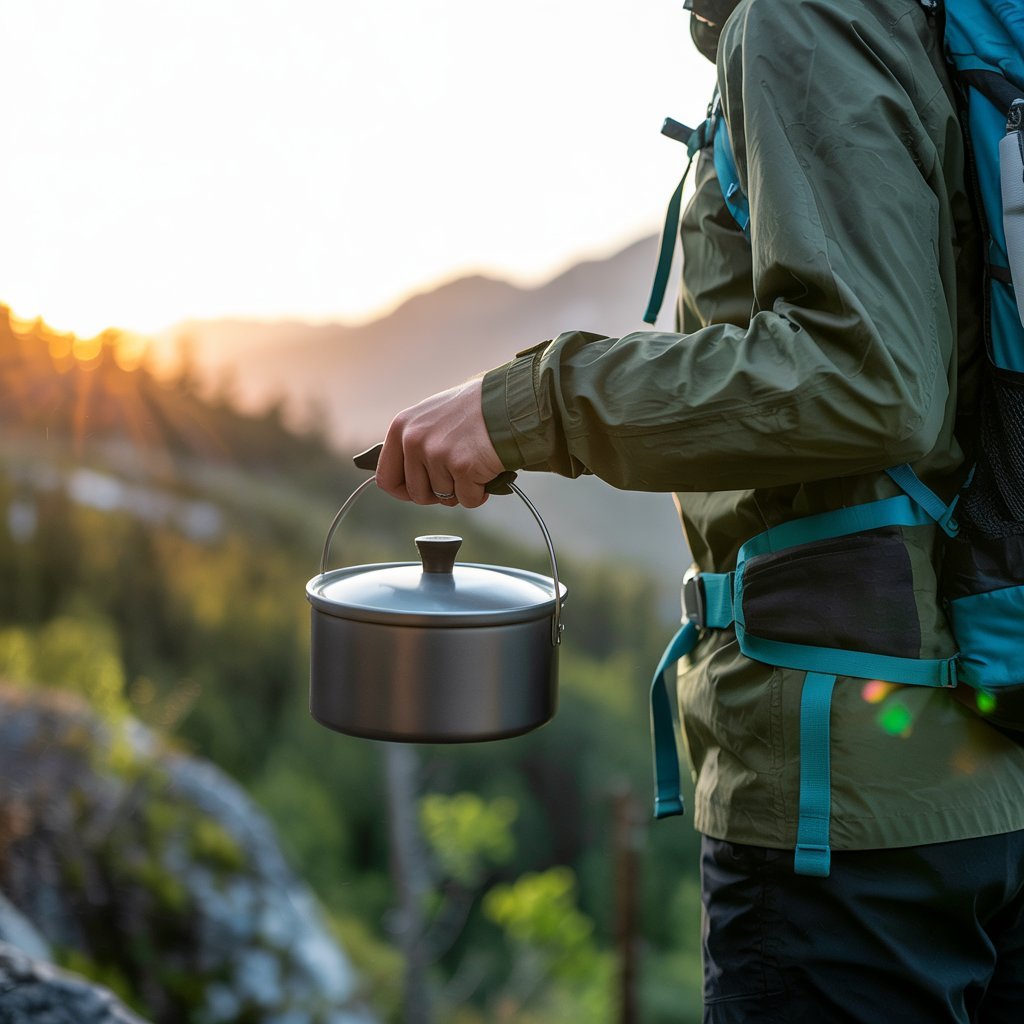Choosing the best pot for backpacking can make or break your backcountry cooking experience. Whether you’re boiling water for dehydrated meals, brewing coffee, or cooking a backcountry feast, the right pot should be lightweight, durable, efficient, and easy to pack.
In this guide, we’ll break down:
- Key factors to consider when selecting a backpacking pot
- Top backpacking pot recommendations (for solo hikers, groups, and ultralight enthusiasts)
- Material comparisons (titanium vs. aluminum vs. stainless steel)
- Accessories that enhance cooking efficiency
- Pro tips for maintaining and choosing the right size
By the end, you’ll know exactly which pot is best for your adventures.
. Key Factors to Consider When Choosing a Backpacking Pot
Weight
- Ultralight backpackers prioritize titanium or thin aluminum pots (under 6 oz).
- Group camping may require slightly heavier but larger-capacity pots.
Material
| Material | Pros | Cons | Best For |
|---|---|---|---|
| Titanium | Lightest, corrosion-resistant, durable | Expensive, uneven heating | Ultralight hikers |
| Aluminum | Affordable, heats evenly | Can dent, less durable | Budget-conscious backpackers |
| Stainless Steel | Durable, good heat retention | Heavier, slower to heat | Car camping, base camps |
Size & Capacity
- Solo hikers: 600–900 mL
- Two-person trips: 1–1.5 L
- Groups (3+ people): 2+ L
Lid & Handles
- A secure lid speeds up boiling and retains heat.
- Foldable handles save space and prevent burns.
Compatibility with Stoves
- Wider pots work better with canister stoves.
- Narrower pots are more fuel-efficient but slower to boil.
. Best Backpacking Pots of 2024
Best Ultralight Pot: Toaks Titanium 750mL
- Weight: 3.9 oz
- Material: Titanium
- Why? Super lightweight, durable, and great for solo hikers.
Best Budget Pot: GSI Outdoors Halulite 1.1L
- Weight: 7.5 oz
- Material: Hard-anodized aluminum
- Why? Affordable, heats evenly, includes a lid.
Best for Groups: MSR Alpine Stowaway 2L
- Weight: 10.3 oz
- Material: Hard-anodized aluminum
- Why? Large capacity, nesting design, durable.
Best All-in-One System: Jetboil Flash
- Weight: 13.1 oz (including stove)
- Material: Aluminum
- Why? Integrated stove, fast boiling, insulated cup.
Best Stainless Steel Option: Stanley Adventure Camp Cook Set
- Weight: 1 lb 2 oz
- Why? Extremely durable, great for car camping.
. Titanium vs. Aluminum vs. Stainless Steel
Titanium (Best for Ultralight)
✅ Pros:
- Lightest option
- Won’t corrode
- Long-lasting
❌ Cons:
- Expensive
- Uneven heating (can scorch food)
Aluminum (Best Balance of Weight & Cost)
✅ Pros:
- Affordable
- Heats evenly
- Lightweight
❌ Cons:
- Can dent over time
- Not as durable as titanium
Stainless Steel (Best for Durability)
✅ Pros:
- Nearly indestructible
- Good heat retention
❌ Cons:
- Heavy
- Slower to boil
. Essential Backpacking Pot Accessories
Lid with Strainer
- Helps with pouring and cooking pasta.
Insulated Cozy
- Retains heat, saving fuel.
Pot Gripper
- Prevents burns when handling hot pots.
Nesting Cup/Bowl
- Saves space (e.g., Snow Peak Trek 700).
. Pro Tips for Backpacking Pots
✔ Use a windscreen to improve stove efficiency.
✔ Clean soot off titanium with baking soda paste.
✔ Measure water to avoid wasting fuel.
✔ Pack a small sponge for easy cleaning.
. Final Verdict: What’s the Best Backpacking Pot?
| Category | Best Choice |
|---|---|
| Ultralight Solo Hiker | Toaks Titanium 750mL |
| Budget-Friendly | GSI Halulite 1.1L |
| Group Camping | MSR Alpine Stowaway 2L |
| Integrated Stove System | Jetboil Flash |
. Conclusion
The best backpacking pot depends on your needs:
- Going ultralight? Titanium is king.
- Cooking for two? A 1–1.5L aluminum pot is ideal.
- Need speed? A Jetboil system boils water fastest.
No matter your choice, prioritize weight, durability, and efficiency. Now, get out there and enjoy a hot meal on the trail!

